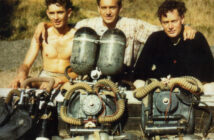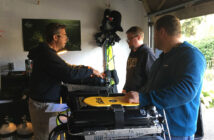Brian Bugge, a U.S. Pacific Fleet Integrated Undersea Surveillance Systems officer, was off-duty, on a closed-circuit rebreather training dive in Honolulu, when he died three years ago on May 20, 2018.
After months of collaboration with Ashley Porsche Bugge and the dive team to tell their emotional and powerful tale, the film ‘If Only’ was released on May 20, 2020, changing perspectives on how diving accidents can occur. The film was made to leave a legacy for others to benefit from.
The failures depicted in this film are applicable to all organizations and high-risk activities – a convergence or emergence of failures from a system that usually worked well, but where a lack of psychological safety stopped team members from speaking up when anything wasn’t quite right.
Ensign Brian Bugge, 35, had taken up rebreather diving as “his next diving adventure” shortly after settling down on Kewalo Basin, Hawaii, the year prior to his death.
Before losing consciousness and sinking under the waves, Brian Bugge jumped off the dive boat, was handed his underwater camera, and possibly took a couple of breaths from his dive rig.
Closed-circuit rebreathers, which don’t release bubbles, are used by Navy SEALs, recycle exhaled air, extract carbon dioxide, and introduce oxygen and other gases into a “loop” mouthpiece. Divers can go much deeper and remain underwater for much longer than they do with conventional scuba equipment. Rebreathers, if not used correctly, may be lethal if not used properly.
According to a Divesoft (manufacturer) equipment inspection, Bugge, 35, had not switched on the oxygen supply to his Liberty rebreather. Brian’s body was recovered at 120 feet near the Sea Tiger wreck which he and his dive buddies planned to dive. Brian’s death was dubbed Hypoxia, which is caused by a lack of oxygen and has only one symptom underwater: death. Hypercapnia, or carbon dioxide poisoning in the breathing loop, causes breathlessness, uncertainty, and errors of judgment, and is quickly accompanied by death underwater.
Brian left behind his wife, Ashley and two children; their third child was born just two months after Brian’s accident.
Video narrated by Gareth Lock of Human Diver.








